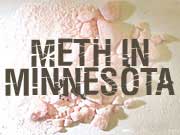Meth makes its way into Minnesota schools
June 14, 2004
 |
| Tyler has struggled in school since he used meth. "I have no short-term memory. And my brain -- I don't know what's wrong with it. I've never been the same since I used meth," he says. This photo has been altered to protect Tyler's identity. (MPR Photo/Dan Gunderson) |
Fergus Falls, Minn. — Tyler is 17. He's thin, with neatly trimmed blonde hair and a choirboy face. He grew up in a middle-class family in the small northwestern Minnesota town of Pelican Rapids. About a year ago he was at a party, drinking beer and smoking pot, when friends pushed him to try meth.
"'If you're going to be with us you gotta do meth,'" Tyler recalls them saying. "I was thinking that's a way I could be cool with them. I was pressured for about two hours to do it -- because I promised myself, I promised my family, I promised my brother, I promised a lot of people I'd never do it. And I did it."
"When I took the hit it was just like, it just felt so great, my body felt so good, it was so great I told myself, 'I'm never going to quit this,'" he says.
Tyler started smoking meth a couple times a week. Then every day. Then two or three times a day. In six months he lost 50 pounds. His skin turned yellow.
 | |||
Tyler says meth consumed him. If he wasn't using meth he was thinking about the drug. He wore makeup to cover the purple circles under his eyes. He developed a hair-rigger temper, once smashing all the windows out of a friend's car over a $10 debt. He remembers driving around at night randomly firing a rifle out the window. He was convinced the FBI and DEA were following him. But he felt invincible.
"I thought when I wore sunglasses no one could see me," says Tyler. "After being awake for about two weeks, I didn't think anyone could see me. Four in the morning -- walked right by a cop with my sunglasses on. He started talking to me and I just walked away, didn't think he could see me."
Tyler was arrested and sent to a drug treatment program. He recently completed a stay at a halfway house. He's moved back home and is trying to avoid his old friends.
"I had to separate from every one of my friends. It was difficult because I had a friend ever since I was in kindergarten, and he's still using -- and I can't hang around with him 'cause the fact is I'm going to use if I do," says Tyler.
Last summer is mostly a blank for Tyler. This summer he's working two jobs and trying to catch up on school work. He wants to graduate from high school next year. But he feels like he's lost part of his brain.
 | |||
"I have no short-term memory. And my brain -- I don't know what's wrong with it. I've never been the same since I used meth," says Tyler. "I used to be an 'A' student. Now I try as hard as I can, and I'm a 'C' student in an alternative school."
Some researchers say methamphetamine causes permanent chemical changes in the brain. Tyler's brain may never recover from the damage done by meth.
Tyler's story is not unique in Ottertail County, and it is those stories that motivate Sheriff Brian Schlueter to speak to students at every opportunity.
Early on a Monday morning, Sheriff Schlueter gives his presentation to about 40 high school students in Fergus Falls. The sheriff is the primary drug prevention program here.
He talks briefly about alcohol, which is by far the drug most commonly abused by students. But his focus soon shifts to the drug that frightens this veteran cop -- methamphetamine. His jail is full of meth addicts and he sees no end in sight.
|
I bought drugs in school. Two slaps of the hands. You slap someone's hand and give them the money. They slap your hand and give you the drugs. It just looks like some goofy handshake you do.
- Melissa, a Fergus Falls high school student |
Schlueter doesn't mince words. He tells the students he knows meth is in this school -- maybe some of them even use it. He says a student here was recently caught brewing a batch of meth in his backpack.
He tells them guys who use meth will most likely end up dealing drugs or stealing to support their habit. Girls, he says, will turn to sex for drugs.
"It'll take you where you never thought you could ever possibly go," says Schlueter. "I can think of one girl from our county who was basically a straight 'A' student as a junior. She got into this stuff, and now she's living out in a shacky old house with a bunch of 50-year-old drug dealers. It's just pathetic."
Sheriff Schlueter tells the students if they choose to use meth, they'll end up in jail, in drug treatment -- or dead. He tells them he can't stop them from using the drug. They must take a stand against meth.
As the students file out of the classroom the sheriff packs up his laptop computer. He shakes his head and wonders aloud if he's getting through to these kids.
"Some are looking around and talking, some have their eyes closed, and you wonder if anything is doing any good sometimes. But I think they are hearing, and I think it gets the thought process going. Whether it's wide sweeping good I don't know. I hope so," says Schlueter.
The sheriff felt he simply has to do something. He thinks drug prevention efforts in schools are a miserable failure.
"In the past we'd teach DARE in the fifth grade and say, 'You're good to go now,'" explains Schlueter. "Obviously that hasn't worked, and it's a formula for failure if that's all you do. I'm not saying DARE was bad, but you have to do more than that."
The sheriff thinks many schools are behind the curve on the meth problem, and that many school administrators and parents are in denial.
There's no statewide drug prevention effort in Minnesota. It's up to individual schools to decide if they need prevention programs. Most get some federal funding under the Safe Schools initiative. But to get the money, schools must develop anti-violence programs. That may leave little money for drug prevention.
Fergus Falls high school principal Greg Winter says his school is not ignoring meth. He says there is relatively little money for prevention programs, but he expects to stay ahead of the problem.
 | |||
"I don't think we're any worse off or better off than any other schools. I think we have some minor activity. I think with all the education we have out there, we're hoping to keep it to a minimum," says Winter.
A Fergus Falls high school student who wants to be identified only as Melissa says meth is fast becoming the students' drug of choice. She says it's easier to get than alcohol or marijuana.
Melissa grew up in what she calls an all-American family. Her dad is a successful businessman. She got good grades in school. But last summer she started using meth, and she took the habit with her back to school in the fall.
"I bought drugs in school," says Melissa. "Two slaps of the hands. You slap someone's hand and give them the money. They slap your hand and give you the drugs. It just looks like some goofy handshake you do. The teachers could be right in front of you. It doesn't matter because no one pays attention."
There's no up-to-date scientific survey of meth use in this school or other Minnesota schools. Fergus Falls principal Greg Winter says if there's meth use it's minimal, maybe a handful of students. Law enforcement officials think it's more than that, but they don't know for sure. Chemical dependency counselors can't say how common meth use is among students.
So how common do kids think methamphetamine is in school? Melissa says one in five students in her school use meth. She says users include athletes and honor students.
"It's not just your typical pot-smoking loser that skips school and goes and does drugs. It's everyone. I mean everyone is susceptible," says Melissa.
Even while she was using meth, Melissa says she maintained good grades. Her parents and teachers had no idea she was going to school high every day.
 | |||
This winter the paranoia and hallucinations began to scare her, she says. She quit using meth on her own and joined a local Narcotics Anonymous group for support. Melissa says she's been clean four months, but still craves meth every day.
"Because the drug is your best friend and you have to say goodbye to that. And it's a hard thing to do to say goodbye to any of your closest friends," says Melissa.
Meth became Melissa's friend because she felt like an outsider at school. "I've never been popular, I've never been the most beautiful girl in school, I've never been in that group that's so looked up to by the rest of the school," says Melissa. "So I thought well, I'll just use drugs, because I don't matter anyways."
Melissa says she now has a purpose in life. She's volunteering with a local organization that takes meth addicts into schools and communities to tell their stories.
Melissa says prevention programs in the schools had no effect on her or her friends. She says they mostly ignored law enforcement presentations on the dangers of drug use.
So what do kids think is the most effective prevention? Melissa and a half dozen other students all gave the same answer -- random drug testing.
"Because that's an awesome excuse to tell someone, 'I can't do this, because I get random drug tests from my parents and I'll be in huge trouble if I have any drugs in my system.' I mean, giving your kids drug tests is probably the best prevention you can use," says Melissa.
Experts say prevention is the key to slowing the spread of meth in schools. But as one state official says, it's hard to think about prevention when you're trying to stop the bleeding.
|
News Headlines
|
Related Subjects
|

